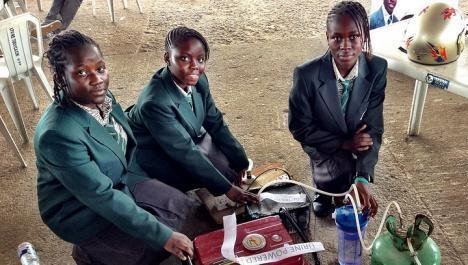LAGOS, Nigeria (GPI)-- When teenager Adebola Duro-Aina read a story online during July 2012 about nine members of a family dying from a generator’s carbon monoxide fumes, she says she thought about what she could do to provide a safer energy alternative. "I was sad about how people died while trying to provide electricity for themselves, trying to make their living better," Adebola says from the chemistry laboratory of Doregos Private Academy, a junior and senior secondary school in Lagos, a city on Nigeria’s southwestern coast. On the wall beside the blackboard reads a quote from Charles Darwin: "Intelligence is based on how efficient a species became at doing the things they need to survive." Adebola says that when the next academic year began during September 2012, she enlisted three friends, Oluwatoyin Faleke, Eniola Bello and Abiola Akindele, all students between 14 and 15 years old in her science class. They decided to design a generator that ran off an alternative fuel that wouldn’t harm users. With the help of their teachers, the girls worked on the project after school for months, Adebola says. They finished constructing a urine-powered generator in time for the Maker Faire Africa, an annual pan-African conference of handicrafters, which took place in Lagos during November 2012. Four teenage girls invented the urine-powered generator as a safer and more sustainable solution to Nigeria’s failing electricity system. The after-school project sparked interest nationally and internationally after its exhibit at Maker Faire Africa. Although Nigeria’s electricity levels peaked during December 2012, Nigerians says that service is still unreliable. The girls hope to partner with larger companies to produce the alternative generator on a mass scale, although some say it’s too bulky, expensive and unrealistic to solve Nigeria’s electricity challenges. Only 50 percent of Nigerians had access to electricity during 2009, according to the U.S. Energy Information Administration, an independent statistics and analysis group. This left approximately 76 million people without electricity. There were power outages for about 46 days per year, lasting on average almost six hours, during 2007 and 2008, according to the World Bank. Adebola and her friends wanted to manufacture a generator that would use alternative energy sources, she says. "We asked, what could be an alternative to our carbon-based fuels, which produce carbon monoxide?” Adebola says. “We also have the issue of fuel scarcity in Nigeria from time to time, so even the fuel is not so available.” Oluwatoyin says that her family uses four fuel-powered generators in her house, two large ones and two small ones, to power their different appliances. “The big one is for washing machine and for bigger appliances in the house,” she says. “Meanwhile, the small ones are for small things like fan and TV. We use a lot of fuel in my house.” She says that fuel limitations present a challenge. “There is an allocation for each day,” she says. “If you finish it, that's all." Eniola says she and her friends spoke with their teachers and reviewed materials for the generator’s design.
Advertisement















